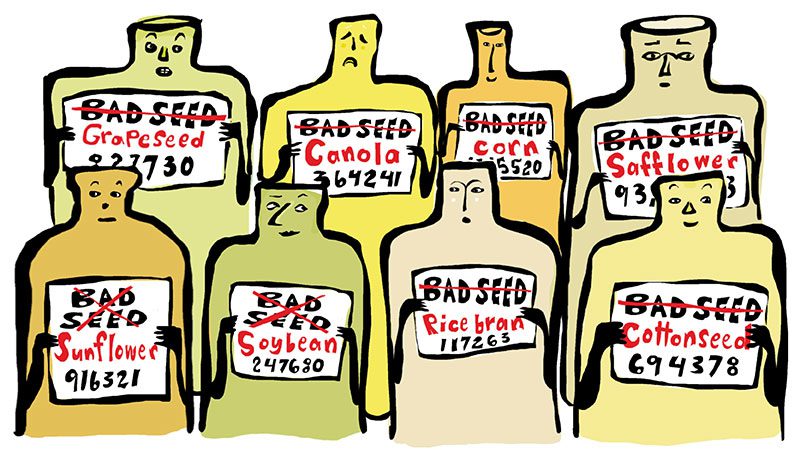The seed oil controversy: What science really says
By Rebecca Robinson

Illustration by Wendy Wahman.
Are seed oils toxic? Claims keep circulating on health blogs and on social media sites suggesting that seed oils contribute significantly to chronic illness and must be avoided completely. PCC gets regular questions about why the co-op, with its rigorous standards governing healthy and sustainable products, stocks and uses some seed oils.
In the April Sound Consumer, we explored the definition and the history of seed oils, and how they infiltrated the modern diet. In this issue, we will address questions about their safety. While the issues are complex, the conclusions are not: Evidence does not support the idea that seed oils are vastly, inherently unhealthy.
Why people worry about seed oils
The notion that seed oils are harmful has gained more mainstream attention in recent years, even leading some brands and fast-food chains to advertise that they do not use seed oils. (As we mentioned earlier, the most reviled common seed oils, sometimes called “the hateful eight,” are canola, grapeseed, sunflower, safflower, rice bran, cottonseed, soybean, and corn. These are widely used in cooking due to their neutral flavors and high smoke points.)
Critiques of seed oils vary, but involve two main concerns: One fear is that seed oils contain toxic chemicals as a result of their processing. The other fear is that seed oils cause inflammation that leads to chronic disease.
Experts in nutrition and health sciences say that the overwhelming body of research doesn’t support either claim. While it’s possible to find individual studies that appear to corroborate some specific concerns, the available evidence overwhelmingly suggests that seed oils as replacements for saturated fats have a net benefit on health in the general population.
That does not mean all objections to seed oils are unjustified. PCC shares concerns in some areas and has put guardrails around the use of seed oils. In just one example, the co-op does not sell or use cottonseed oil, because it is not a food crop and must be highly processed to be considered safe.
The current wave of opposition to seed oils is based on three issues: Processing, oxidation, and inflammation:
Can you buy safely processed seed oils?
Seed oil opponents raise concerns about how these oils are made. PCC shares this concern. Seed oils can be extracted using a substance called hexane, a toxic substance that can cause neurological damage in humans. Companies remove the hexane from the finished product, but trace amounts can remain. The European Union has established maximum allowed levels for hexane contamination, but the United States has not regulated them to date.
While there isn’t substantial evidence indicating that solvent extracted oils are harmful, there also are not enough solid studies on the issue to draw a definitive conclusion. Therefore, PCC errs on the side of caution and does not sell any cooking oils made using chemicals like hexane. Buying organic cooking oils is another good general way to avoid cooking oils contaminated with hexane residue, as organic regulations prohibit the use of solvent extracted methods.
Cooking at high temperature with seed oils
Another concern around seed oils is fear that they will form harmful chemical compounds when repeatedly heated at high temperatures. This concern is also supported by credible evidence. Repeatedly heating oil to high temperatures accelerates degradation and oxidation, leading to the formation of compounds like polyaromatic hydrocarbons (PAH), which are linked to an increased risk of cancer. That is one reason why we don’t deep fry food in PCC’s deli, and we never reuse oils when we are baking, sautéing, and roasting foods.
DO Seed oils CAUSE inflammation?
At the heart of the modern seed oil controversy is the suggestion that the oils are toxic because they contain higher levels of Omega-6 fatty acids than Omega-3 fatty acids. Both compounds are considered “essential” fatty acids that the human body needs to live but cannot produce, meaning we must get them from what we eat.
The accusations of toxicity are two-fold: First, seed oil objectors note that Omega-6s contain linoleic acid, which can be converted in the body to arachidonic acid, which in turn can contribute to inflammation. Second, they suggest that the high level of Omega-6 acids in seed oils skews the ratio that humans are supposed to maintain with their Omega-3 and Omega-6 consumption.
Nick Rose, former PCC nutritionist and now an assistant professor at Bastyr University, believes both claims aren’t so simple. Rose explained that when people consume seed oils, our bodies only metabolize as much linoleic acid as it needs into arachidonic acid. Only a small amount of linoleic acid is ultimately converted into arachidonic acid; linoleic acid can also become building blocks for anti-inflammatory compounds.
Furthermore, seed oils aren’t the only source of arachidonic acid created from linoleic acid. It is also found in chicken, eggs, and other animal proteins, none of which draw public concern. Those concerned about arachidonic acid need to look at those other sources too.
While unhealthy levels of inflammation can be a driver of chronic illness, moderate inflammation is a natural part of our immune system. It helps us respond to and recover from injury. Inflammation becomes problematic only when it is chronic and excessive. That’s also when its correlations with cancer and other illnesses start appearing.
According to Eric Decker, a University of Massachusetts food scientist, most of the concerning studies linking Omega-6 to excessive inflammation were done on rodents. Rodents don’t process linoleic acid the same way as humans do, so results from rodent studies aren’t directly transferable to humans – and human studies have not produced the same results. To date, claims about Omega-6 and inflammation are not backed by corroborating studies. If anything, research continues to demonstrate the protective effects of Omega-6 and polyunsaturated fats. Given those findings, nutritionists typically recommend simply adding more Omega-3 to diets rather than cutting back on Omega-6s.

Seed oils and the “big food” lie
Seed oils critics point to a handful of studies to support claims about their dramatic ill effects. However, many of these studies are flawed in significant ways. For example, a 2013 National Institute of Health study of data gathered from 1966-1973 is sometimes cited. That study evaluated the effectiveness of replacing saturated fats with Omega-6 fats to prevent coronary heart disease. However, the study’s subjects were consuming both seed oils and trans fats. We now know trans fats are extremely unhealthy, and cannot dismiss the effects they may have had on the study’s subjects, independently of the seed oils.
While it is easy to dismiss such caveats as being part of a “big food” lie, backed by corporations who have financial interests in promoting seed oils, companies are using the “anti-seed” movement to their financial benefit as well.
Some fast food chains that are aware of the growing anti-seed oil trend have tried to use that to their advantage, marketing themselves as being seed oil free – which does not, of course, make their food nutritious or unprocessed.
When using scientific studies to back up a public health issue, Rose emphasizes an important lesson he teaches his students: Don’t rely on one study, but look at the direction of the entire body of literature.
We have written about how trans fats became highly popular in the U.S. and then, almost as quickly, started being phased out of mainstream diets. That was a good example of scientific cohesion. When researchers began studying the potential health impacts of trans fats, the data all led to the same conclusion of harm. Looking at scientific literature to date, the same cannot be said about seed oils. When trans fats were at the height of popularity, they were found in many food products and widely used in fast food establishments. Despite those “big food” corporate interests, and financial incentives to keep trans fats in place, the science around their negative health impacts took precedence and they were phased out. We do not dismiss the impacts of corporate power on the U.S. food system, but it is important to note that it is not absolute.
Seeing the food forest through the seed trees
People who eliminate seed oils from their diet extol the resulting health changes they notice, like improved energy and weight loss. But nutritionists urge individuals to think critically about how they cut out seed oils. Experts suspect that the benefits may not be from avoiding seed oils directly, but the result of consuming fewer of the ultra-processed foods that commonly contain them. Ultra processed foods are often high in sugar, fat, and sodium, and contain chemical additives that can adversely impact gut health.
Americans are becoming more aware of the relationship between chronic illness and diet, and PCC appreciates that our shoppers and members are especially aware of health and nutrition. As a purpose-driven co-op that sets standards around food additives and ingredients, it is our responsibility to critically examine the information and evidence on these topics. We take comments from our shoppers seriously and have weighed those comments against our own research.
The evidence on seed oils, we find, shows some reasonable cautions can be taken around their use, such as avoiding oils that have been extracted by solvents. However, we cannot support extreme claims about toxicity that blatantly contradict the available facts.
We respect everyone’s choices about what they choose to eat, but note that, rather than seeking to eliminate seed oils specifically, experts recommend diversifying your fat intake, consuming plenty of whole, nutrient rich foods, and limiting processed or fast foods. We would also encourage anyone concerned about seed oils further to speak with your physician or speak directly with a dietitian to identify a well-rounded diet to support long-term health goals.
Rebecca Robinson is PCC’s quality standards manager.
